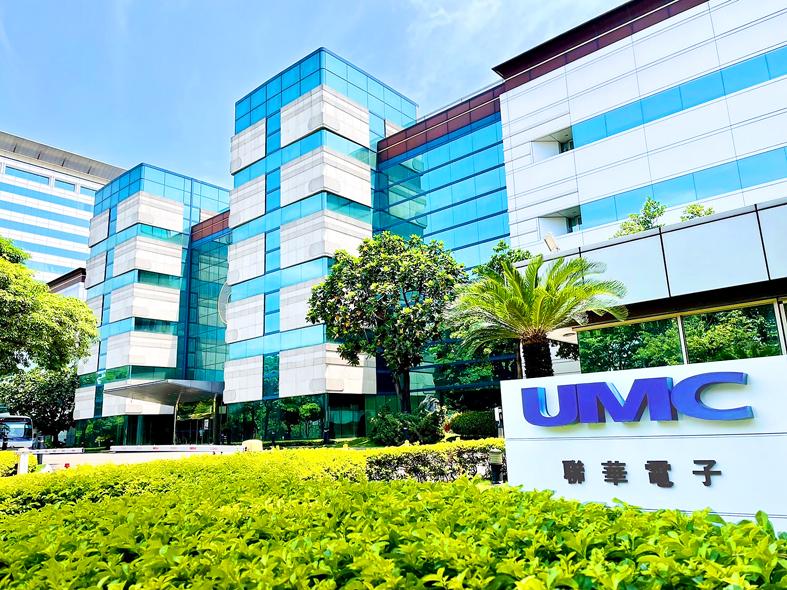United Microelectronics Co (UMC, 聯電), the world’s No. 2 foundry service provider, yesterday posted record net profit for last quarter, as growing demand for automotive, server and networking chips helped offset weakness in the smartphone and notebook computer segments due to China’s lockdowns.
Orders for automotive, server and networking chips accounted for more than 20 percent of UMC’s revenue, it said.
Net profit last quarter soared about 90 percent to NT$19.81 billion (US$673.9 million) from NT$10.43 billion a year earlier and gained 24.2 percent from NT$15.95 billion the previous quarter, UMC said.

Photo: Grace Hung, Taipei Times
Gross margin jumped to 43.4 percent, exceeding its estimate of 40 percent and hitting the highest in about 22 years.
Despite the economic turbulence, UMC said it still aims for revenue to grow by at least 20 percent this year, given that 40 percent of its wafer capacity is under long-term supply agreements.
On Tuesday, UMC said it signed a supply agreement with Japan’s Denso Corp to build wafer capacity to produce automotive chips at UMC’s Japanese fab from next year.
“For 2022, it remains a challenge for us to meet rising demand. In the near term, neither demand nor inventory fluctuations at customers has imbalanced supply and demand for UMC,” UMC copresident Jason Wang (王石) told a quarterly meeting yesterday.
“Our outlook for 2022 remains solid,” Wang added.
UMC maintains its forecast that average selling prices are to increase 14 to 16 percent this year, Wang said.
The firm has raised this year’s capital expenditure to US$3.6 billion from an earlier budget of US$3 billion, as it adds more capacity at its Tainan and Singapore fabs.
UMC said that its capacity this year is expected to increase 20 percent, compared with last year.
The firm said it expects wafer shipments this quarter to be as much as 5 percent higher than last quarter, while wafer prices are expected to rise 3 to 5 percent.
Gross margin is expected to increase to about 45 percent this quarter, thanks to price hikes and a better product mix, it said, adding that factory utilization would be 100 percent.

Semiconductor shares in China surged yesterday after Reuters reported the US had ordered chipmaking giant Taiwan Semiconductor Manufacturing Co (TSMC, 台積電) to halt shipments of advanced chips to Chinese customers, which investors believe could accelerate Beijing’s self-reliance efforts. TSMC yesterday started to suspend shipments of certain sophisticated chips to some Chinese clients after receiving a letter from the US Department of Commerce imposing export restrictions on those products, Reuters reported on Sunday, citing an unnamed source. The US imposed export restrictions on TSMC’s 7-nanometer or more advanced designs, Reuters reported. Investors figured that would encourage authorities to support China’s industry and bought shares

FLEXIBLE: Taiwan can develop its own ground station equipment, and has highly competitive manufacturers and suppliers with diversified production, the MOEA said The Ministry of Economic Affairs (MOEA) yesterday disputed reports that suppliers to US-based Space Exploration Technologies Corp (SpaceX) had been asked to move production out of Taiwan. Reuters had reported on Tuesday last week that Elon Musk-owned SpaceX had asked their manufacturers to produce outside of Taiwan given geopolitical risks and that at least one Taiwanese supplier had been pushed to relocate production to Vietnam. SpaceX’s requests place a renewed focus on the contentious relationship Musk has had with Taiwan, especially after he said last year that Taiwan is an “integral part” of China, sparking sharp criticism from Taiwanese authorities. The ministry said

CHANGING JAPAN: Nvidia-powered AI services over cellular networks ‘will result in an artificial intelligence grid that runs across Japan,’ Nvidia’s Jensen Huang said Softbank Group Corp would be the first to build a supercomputer with chips using Nvidia Corp’s new Blackwell design, a demonstration of the Japanese company’s ambitions to catch up on artificial intelligence (AI). The group’s telecom unit, Softbank Corp, plans to build Japan’s most powerful AI supercomputer to support local services, it said. That computer would be based on Nvidia’s DGX B200 product, which combines computer processors with so-called AI accelerator chips. A follow-up effort will feature Grace Blackwell, a more advanced version, the company said. The announcement indicates that Softbank Group, which until early 2019 owned 4.9 percent of Nvidia, has secured a

TECH SECURITY: The deal assures that ‘some of the most sought-after technology on the planet’ returns to the US, US Secretary of Commerce Gina Raimondo said The administration of US President Joe Biden finalized its CHIPS Act incentive awards for Taiwan Semiconductor Manufacturing Co (TSMC, 台積電), marking a major milestone for a program meant to bring semiconductor production back to US soil. TSMC would get US$6.6 billion in grants as part of the contract, the US Department of Commerce said in a statement yesterday. Though the amount was disclosed earlier this year as part of a preliminary agreement, the deal is now legally binding — making it the first major CHIPS Act award to reach this stage. The chipmaker, which is also taking up to US$5 billion